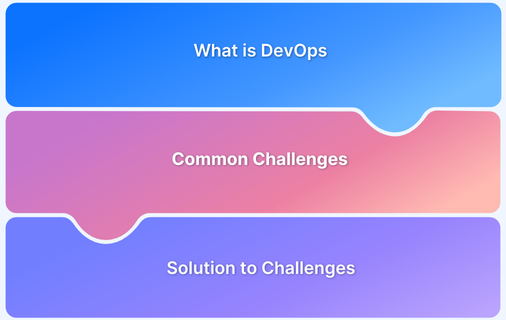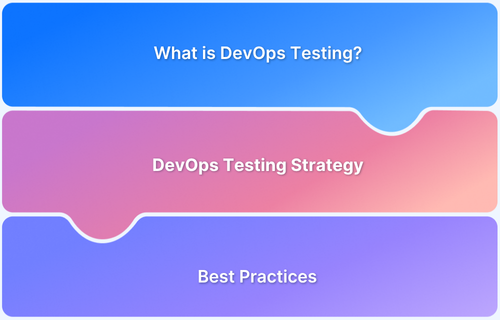DevOps connects the gap between development and operations, enabling teams to streamline workflows, improve collaboration, and accelerate innovation.
This article explores why DevOps is indispensable for modern organizations and how it impacts their software development process.
What is DevOps?
DevOps is a set of practices, tools, and cultural philosophies that integrate software development (Dev) and IT operations (Ops).
It emphasizes automation, Continuous Integration (CI), and Continuous Delivery (CD), allowing teams to build, test, and deploy software more efficiently. DevOps promotes collaboration and a shared responsibility for success, fostering a more agile and productive environment.
Read More: Why is DevOps important
Why DevOps?
By adopting DevOps practices, organizations can achieve these benefits:
- Speed and Agile Development
- Improved Communication and Collaboration
- Increased Efficiency and Automation
- Improved Security
- Greater Scalability
- Enhanced Customer Satisfaction
- Reduced Costs
- Reduced Time to Market
- Improved Business Resilience
In DevOps, development and operations teams work together across the entire application lifecycle, eliminating silos. Engineers gain diverse skills in handling development, testing, deployment, and operations.
In some cases, security and QA teams also integrate, forming DevSecOps. Automation and advanced tools help speed up processes and allow engineers to manage tasks like code deployment or infrastructure provisioning independently. This increases team efficiency and speed.
Read More: DevOps vs DevSecOps
Core DevOps Principles
The core principles of DevOps revolve around promoting a collaborative and efficient software development environment. Here are the key principle
- Collaboration and Communication: Promotes open communication and shared responsibilities. It achieves this by breaking down silos between development and operations teams.
- Continuous Integration and Continuous Delivery (CI/CD): Automates code integration and delivery, enabling rapid, reliable releases with minimal manual effort.
- Automation: Enhances efficiency by automating repetitive tasks like testing and deployment, reducing errors, and increasing productivity.
- Infrastructure as Code (IaC): Manages infrastructure with code and allows scalable, consistent, and version-controlled environments.
- Monitoring and Feedback: Provides real-time insights into system performance. It enables quick issue resolution and continuous improvement.
- Culture of Continuous Improvement: Encourages iterative improvement and adaptation, helping organizations stay agile and responsive to change.
DevOps Lifecycle
The DevOps lifecycle consists of continuous phases that enable seamless software delivery, from development to operations. Here are the key stages that help to adopt a DevOps practice in your organization:
- Plan: Define project requirements, set goals, and create a roadmap to ensure alignment with business objectives.
- Code: Developers write, update, and manage code using version control systems, iterating frequently for improvements.
- Build: Code is compiled into executable artifacts. Automated build tools ensure stability and integration of changes.
- Test: Conduct automated tests to verify code quality and functionality, identifying and fixing bugs early in the process.
- Release: Prepare the build for production, managing configurations and utilizing CI/CD pipelines for smooth, automated deployments.
- Deploy: Roll out the application to end-users with strategies like blue-green or canary deployments to minimize risk and downtime.
- Operate: Monitor the deployed application for performance and availability, ensuring stability and addressing issues as they arise.
- Monitor: Monitor system health and user experience, detect anomalies, and facilitate proactive maintenance.
- Feedback: Gather user and system feedback to identify areas for improvement, guiding future iterations and fostering continuous improvement.
The Four Stages of DevOps Evolution
The evolution of DevOps can be broken down into four stages, each addressing specific challenges in software development and delivery:
Stage 1: Bring Your Own DevOps (BYOD)
Initially, teams used individual tools, which created collaboration challenges due to a lack of tool compatibility. This stage highlighted the need for unified toolsets.
Stage 2: Best-in-class DevOps
Organizations standardized on preferred tools for each DevOps phase, improving collaboration but facing integration difficulties across stages.
Stage 3: Do-it-yourself (DIY) DevOps
Teams built custom integrations between tools to connect workflows. However, these DIY solutions were costly and required extensive maintenance, as tools were not inherently compatible.
Stage 4: DevOps Platform
A unified DevOps platform now streamlines tool integration and enhances collaboration across all teams in a single system, providing visibility and efficiency throughout the DevOps lifecycle.
Read More: DevOps vs TechOps vs NoOps
How are DevOps and CI/CD connected?
The table below highlights how CI/CD fits within the broader DevOps framework, helping to implement its principles and achieve its objectives.
| Aspect | DevOps | CI/CD |
|---|---|---|
| Definition | A cultural and operational framework that integrates development and operations to streamline software delivery. | A set of practices for automating the integration, testing, and deployment of code. |
| Purpose | Improve collaboration, automate workflows, and enhance the speed and quality of software delivery. | Automate the software build, test, and deployment processes to enable frequent and reliable releases. |
| Focus | Encompasses the complete software development lifecycle, from planning to monitoring. | Specifically, it focuses on automating code integration, testing, and deployment. |
| Role in Automation | Promotes automation across all stages, from coding to deployment and operations. | Provides automated pipelines for continuous integration and delivery. |
| Goal | Achieve faster, more efficient, and reliable software delivery. | Enable rapid, frequent, and reliable code releases. |
| Continuous Improvement | Embraces a culture of ongoing iteration and feedback to enhance processes and products. | Supports continuous improvement by enabling fast feedback loops and quick fixes. |
| Key Tools | Docker, Kubernetes, Jenkins, Ansible, Terraform | Jenkins, GitLab CI/CD, CircleCI, Travis CI |
Read More: How to implement CI/CD Pipeline
Benefits of DevOps
Adopting DevOps brings a host of benefits that streamline software delivery, enhance team collaboration, and drive continuous improvement. Here’s how DevOps can transform your organization:
1. Speed and Agile Development: DevOps provides faster software development results. It results in quicker deployment, helping teams adapt to changing markets, customer needs, and competition.
2. Improved Communication and Collaboration: A proper DevOps team structure supports collaboration between development, operations, QA, and security teams. This enhances software quality and reduces errors. Also, it promotes shared ownership and frequent communication, leading to faster responses to business needs.
3. Increased Efficiency and Automation: DevOps automates repetitive tasks through CI/CD tools and thereby streamlines IT operations. BrowserStack Automate provides cross browser testing on real devices which speeds up development and offers seamless user experiences.
4. Better Product Quality: The short development cycles and continuous feedback improve product quality. It helps align with organizational goals and minimizes errors with each iteration.
5. Improved Security: Automated testing, continuous integration (CI), and delivery in DevOps identify vulnerabilities early which boosts security and reduces attack risks.
6. Greater Scalability: DevOps automates infrastructure provisioning, and it allows organizations to scale IT operations easily based on demand.
7. Enhanced Customer Satisfaction: Frequent releases and responsiveness to feedback improve customer satisfaction. Proactive incident management boosts software performance and availability.
8. Reduced Costs: DevOps reduces costs by automating tasks, improving efficiency, and reducing manual testing and deployment efforts.
9. Increased Innovation: DevOps encourages experimentation. It also improves the rapid deployment of microservices, drives innovation, and enables faster testing of new ideas.
10. Reduced Time to Market: Automation and visibility into task durations boost team productivity, reduce errors, and speed up delivery.
11. Better Resource Allocation: DevOps helps prioritize issues and optimize resource allocation. This increases efficiency and productivity.
12. Improved Business Resilience: Faster releases and recovery times enhance resilience. It also maintains security and innovation and turns failures into learning opportunities.
13. Greater Competitive Advantage: Continuous testing and collaboration minimize security risks and reduce the chance of missing critical bugs. It thereby gives businesses an edge.
Pro Tip: Try continuous testing with Jenkins using BrowserStack’s real device cloud and get flawless results and faster release every time.
Challenges in adopting DevOps
Adopting DevOps can bring significant benefits, but it also presents many challenges that organizations must address to ensure a smooth transition. Here are some of the key challenges:
- Cultural Resistance: Shifting to a DevOps model often faces resistance due to a traditional mindset or reluctance to change established processes and roles.
- Skill Gaps: Teams may lack the required skills in automation, cloud infrastructure, or CI/CD pipelines, requiring training or new hires.
- Tooling Complexity: Choosing the right set of tools for automation, integration, and monitoring can be overwhelming, and improper tool integration can hinder adoption.
- Security Concerns: Integrating security into DevOps (DevSecOps) can be challenging, as teams need to embed security practices without slowing down the delivery pipeline.
Read More: Difference between DevOps and DevSecOps
- Legacy Systems: Adapting DevOps to work with outdated, monolithic systems can be complex, requiring significant re-architecting or modernization.
- Collaboration Issues: Breaking down silos between development, operations, and other teams is difficult, especially if there’s a lack of trust or poor communication.
- Automation Costs: Initial setup for automating workflows, testing, and deployment can be expensive in terms of time and resources.
- Performance Measurement: Measuring success in DevOps can be challenging, as traditional metrics may not accurately reflect the improvements in agility and collaboration.
- Scaling DevOps: Scaling DevOps across large organizations with multiple teams can be difficult due to varying practices, tools, and processes.
- Complexity of Continuous Delivery: Implementing continuous integration and continuous delivery (CI/CD) in DevOps across all projects can be complex and require significant testing and deployment process changes.
Top DevOps Tools
Top DevOps tools play a crucial role in automating tasks, managing code, and enhancing collaboration across the software development lifecycle. These tools ensure faster and more reliable releases by supporting continuous integration, delivery, and testing.
Below is a categorized breakdown of some of the most important DevOps tools:
DevOps Automation Tools
DevOps Automation tools reduce manual tasks, streamline repetitive processes, and improve efficiency by automating infrastructure, configuration, and deployments. This frees up teams to focus on strategic tasks and ensures consistent, error-free operations.
1. Ansible
An agentless automation tool that simplifies IT tasks such as configuration management, application deployment, and cloud provisioning.
Key Features:
- YAML-based configurations for easy readability
- Agentless architecture, reducing overhead
- Automates tasks quickly and efficiently
Lightweight and easy to set up, Ansible is ideal for fast automation without the need for agents.
2. Puppet
A robust tool for automating complex infrastructure and configuration management across large environments.
Key Features:
- Declarative language for infrastructure management
- Strong reporting and auditing capabilities
- Scales well for large environments
Great for managing large-scale infrastructure, but its steep learning curve can be challenging for newcomers.
3. Chef
A flexible infrastructure automation tool that uses a Ruby-based domain-specific language (DSL) for managing configurations.
Key Features:
- Ruby-based configuration for powerful scripting
- Cookbooks to manage reusable automation
- Supports cloud and on-prem environments
Chef offers great flexibility, but its complexity makes it harder for beginners to configure.
DevOps Pipeline (CI/CD) Tools
CI/CD tools automate the entire software release process, from integration to deployment. This ensures faster, more reliable releases with fewer errors, helping teams deliver software updates rapidly and efficiently.
1. Jenkins
A popular open-source CI/CD automation server for automating parts of software development like testing, building, and deployment.
Key Features:
- Extensive plugin ecosystem to support a wide range of CI/CD workflows
- Automates tasks like testing, building, and deploying code
- Supports integrations with numerous tools and languages
Jenkins is highly extensible but can be resource-heavy, especially for large-scale builds.
2. Kubernetes
A container orchestration platform that manages and automates deployment, scaling, and operations of containerized applications in CI/CD workflows.
Key Features:
- Automatic scaling of containerized applications
- Load balancing and container self-healing capabilities
- Strong support for microservices architecture
Kubernetes is ideal for managing microservices but comes with a steep learning curve due to its complexity.
Read More: Jenkins vs Ansible: Which to Choose
DevOps Version Control Tools
Version control tools track code changes, facilitate collaboration, and help prevent conflicts or loss of work. They enable teams to work concurrently while maintaining code integrity.
1. Git
A distributed version control system for tracking and managing code changes across teams.
Key Features:
- Powerful branching and merging capabilities for parallel development
- Facilitates collaboration and code sharing among teams
- Extensive community support and integration with many tools
Git is essential for team collaboration but can be complex for new users to grasp initially.
Read More: What is Change Management in DevOps
DevOps Testing Tools
Testing tools ensure that applications are thoroughly tested across various environments. They automate testing processes, reducing time and effort while ensuring software quality and reliability before deployment.
1. Selenium
Selenium Automates browser-based testing for web applications.
Key Features:
- It supports multiple programming languages (Java, Python, C#, etc.).
- Cross browser testing for major browsers like Chrome, Firefox, and Edge
- Integrates seamlessly with CI/CD pipelines for continuous testing
Versatile for web testing, though it requires scripting expertise for efficient use.
2. Nagios
A tool for monitoring system performance, network health, and infrastructure.
Key Features:
- Real-time alerts for system issues
- Customizable monitoring framework for various environments
- Tracks infrastructure health with detailed performance metrics
Reliable for monitoring but can be complex to manage in large-scale systems.
3. Prometheus
A monitoring and alerting tool commonly used with Kubernetes and containerized environments.
Key Features:
- Time-series database with a powerful query language (PromQL)
- Multi-dimensional data model for detailed metrics tracking
- Integrates with Grafana for visualization
Excellent for containerized environments, though it lacks built-in visualization features.
Read More: DevOps Testing Strategy
Useful Resources for DevOps
Understanding DevOps:
- What is DevOps
- DevOps Shift Left Testing: A Detailed Guide
- What is the ultimate goal of DevOps?
- Benefits of DevOps
- What is DevOps Configuration Management?
- What is Continuous Delivery in DevOps?
- What is a DevOps Pipeline? How to Build One
- What is DevOps Observability (Importance & Best Practices)
- DevOps Testing Strategy
- How to improve DevOps Feedback Loop
- Python For DevOps: An Ultimate Guide
- What is DevOps Automation and How is it Helpful?
- Importance of DevOps Team Structure
- The Role of QA in DevOps
- Top Challenges in DevOps and How to Solve Them
- Top 21 Monitoring Tools in DevOps for 2024
Know the difference:
- DevOps vs Scrum: Key Differences
- Breaking Down MLOps vs DevOps: Similarities and Differences
- DevOps vs SysOps: What are the major differences
- DataOps vs DevOps: Key Differences
- TechOps, DevOps, and NoOps: Which one is right for you?
- DevOps vs CloudOps: How are they different
- DevOps Engineer vs Full Stack Developer: Differences
- Synchronize Business Analysis, DevOps, and QA with Cloud Testing
Perform DevOps Integration with BrowserStack
First, assess your organization and form a cross-functional team to integrate DevOps with your workflow. Then, create a DevOps strategy with goals, milestones, and success metrics. Use the right tools to integrate DevOps and prioritize continuous testing for flawless releases.
You can achieve desired testing results using BrowserStack Automate, which helps you get accurate results using real browsers and devices on a Cloud Selenium Grid. Here are some of its benefits:
- Integrations with popular languages and frameworks.
- Parallel testing. Run hundreds of tests to boost execution speed by over 10x.
- Extensive range of debugging tools.
- Uncompromising security with SOC2 and GDPR compliance.
- Integrate quickly using popular languages and frameworks.
- Add BrowserStack to your CI pipeline with easy plugins.
- Debug with video recordings, automated screenshots, and detailed logs (text, console, and network).
- Instant testing on real devices
BrowserStack integrations with CI/CD tools like GitLab, Travis CI, and Jenkins enhance your DevOps workflow by enabling automated testing across a vast real-device cloud.
This ensures your web and mobile apps perform flawlessly on real devices by catching issues early. It results in faster and more reliable releases. With smooth integrations and versatile testing capabilities, BrowserStack helps your team deliver high-quality software with confidence and speed.







